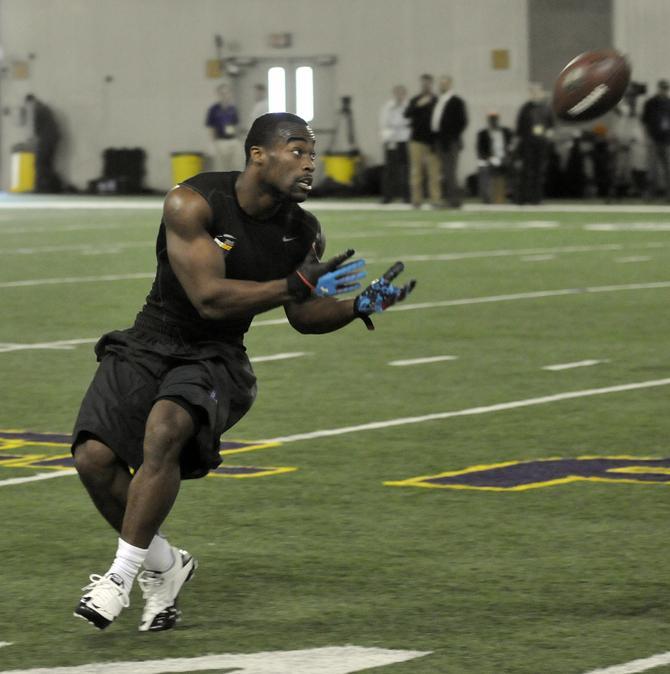During the NFL Combine, the one event that gets the most attention is the 40-yard dash.
But when it comes to running backs, the 40 can be deceiving. Small backs who run lightning-fast but only weigh 160 pounds aren’t going to make it through 10 carries in the NFL before linebackers turn their bones into dust. Conversely, bulldozers whose 40s can be timed with a sundial are likely to make it two yards before guys like 49ers linebacker Patrick Willis take their legs out.
The key is finding a back who can take punishment but also has “breakaway” potential. But how can you compare running backs who have vastly different body types?
Calculate their speed score.
Speed score — an advanced statistic created by Grantland’s Bill Barnwell — measures a running back’s speed-to-weight ratio. So, Brandon Jacobs — a 267-pound wrecking ball who ran a 4.56 in 2005 — has one of the highest speed scores of all time: 123.5. Chris Johnson on the other hand, only weighed 197 pounds but ran a blistering 4.21 for a speed score of 121.4. All-time great Bo Jackson had a speed score of 149.5.
Former LSU running back Michael Ford just missed out on joining the 120 club this offseason. At a weight of 220 pounds, Ford ran a 4.41-second 40 at LSU’s Pro Day. Ford’s weight and speed combo was good for a speed score of 117.33, which ranks second in this year’s draft behind former Arkansas running back Knile Davis. Ford and Davis were the only running backs to break the 110 mark this year.
Ford got lost in the shuffle of LSU running backs last year — five different guys got the chance to carry the ball — but throughout his LSU career showed ability when given a chance. Ford earned a reputation as a “workout warrior” during his time at LSU, with his reported bench press max being 432 and squatting 555 pounds. He doesn’t read blocks that well and lacks patience between the tackles, but I think with some experience he could eventually be a steal in this year’s draft.
Former LSU running back Spencer Ware also has a chance to make some noise in the NFL. Ware had a down year last year, only averaging 3.9 yards a carry, but he brings skills NFL offenses crave right now: pass-catching and blocking. Ware caught more balls than any other back at LSU during the past three years, including last year when he caught 18 balls for 230 yards and a touchdown. Ware worked exclusively in third-down situations, as his larger body gave him the advantage when picking up defenders looking to sack LSU QB Zach Mettenberger.
Ware could be a good pickup in the NFL because of his tough running and diverse skill set. While he didn’t run a 40 at either LSU’s Pro Day or the NFL Combine, according to a CBS report Ware ran a 4.62 40 during a private workout for a team.
Weighing in at 229, Ware breaks the 100 mark with a speed score of 101.53, coming in ahead of highly touted running backs such as Wisconsin’s Montee Ball and Stanford’s Stepfan Taylor. According to NFL.com, Ball and Taylor have draft grades of 75.6 and 72.6, respectively, while Ware’s draft grade is only 59.
The average speed score for a running back in the NFL is a 98, according to Football Outsiders, while the average for a running back taken in the first round is a 112. The 120 mark has been a pretty good predictor of future success. For perspective, running backs who have broken the 120 mark in the past couple of years include Johnson, Andre Brown, Ben Tate and Darren McFadden.
But just because a back has a great speed score doesn’t mean he is going to be a stud in the NFL. It works like any other measurement — use it in combination with film study and other measurements such as the three-cone drill and the 20-yard shuttle. Both A.J. Harris in 2006 and Chris Henry in 2007 had speed scores greater than 120, but nobody knows who they are. However, the only backs with a speed score lower than 98 to make a Pro Bowl have been Brian Westbrook and last year’s steal of the draft, Alfred Morris.
If Ford and Ware can prove to be a little more like Brown or Tate — and a lot less like Harris or Henry — they could be great late-round finds for NFL teams looking to bolster their running attacks.





